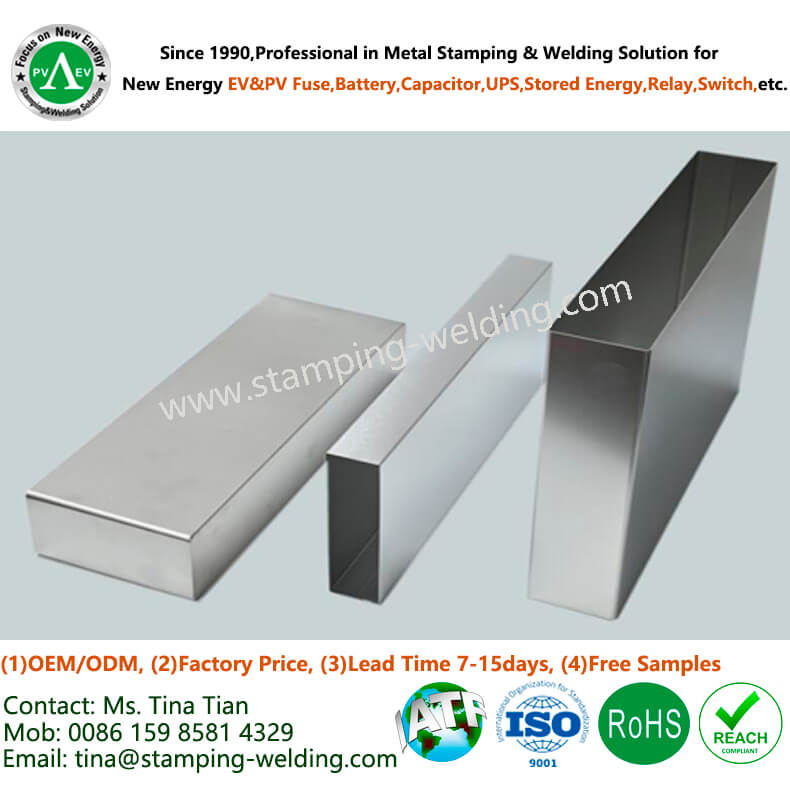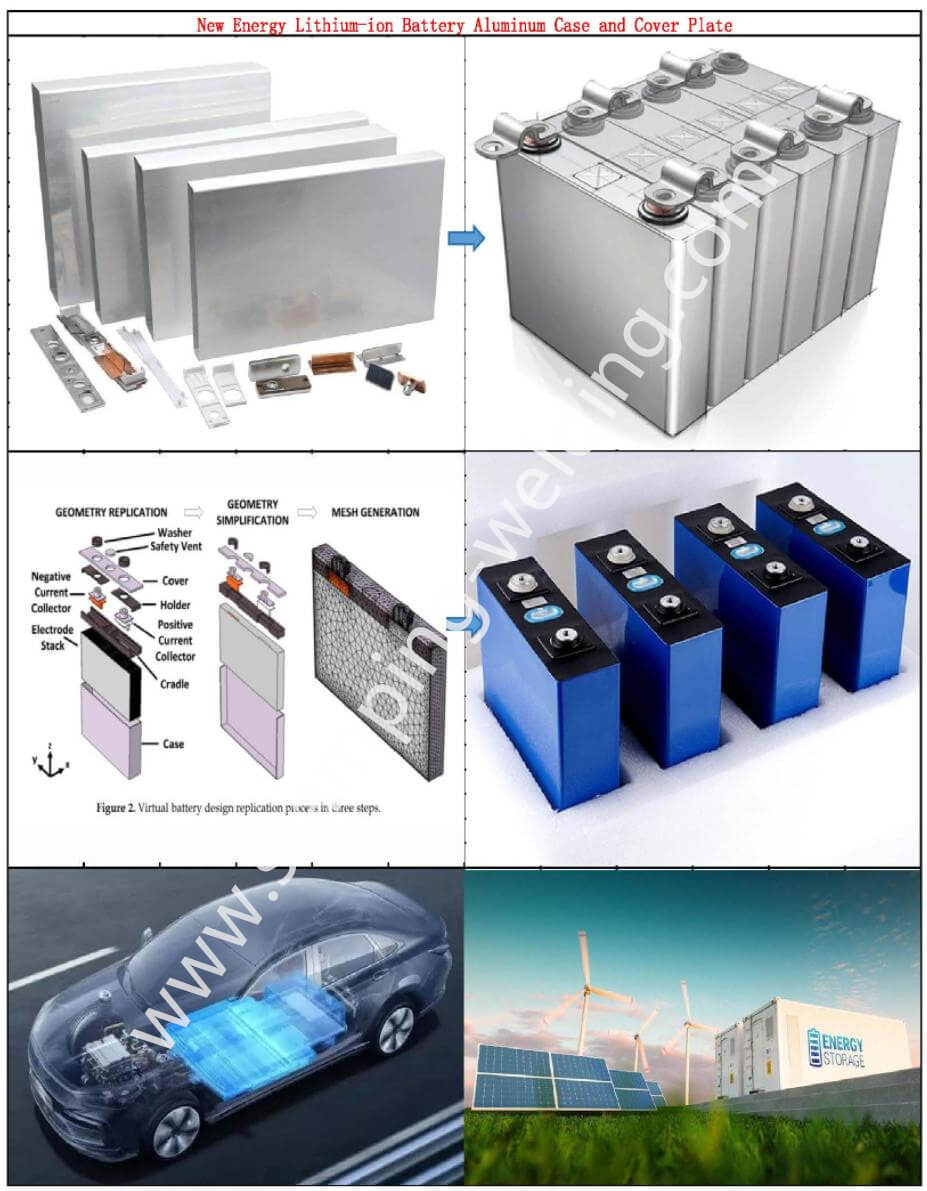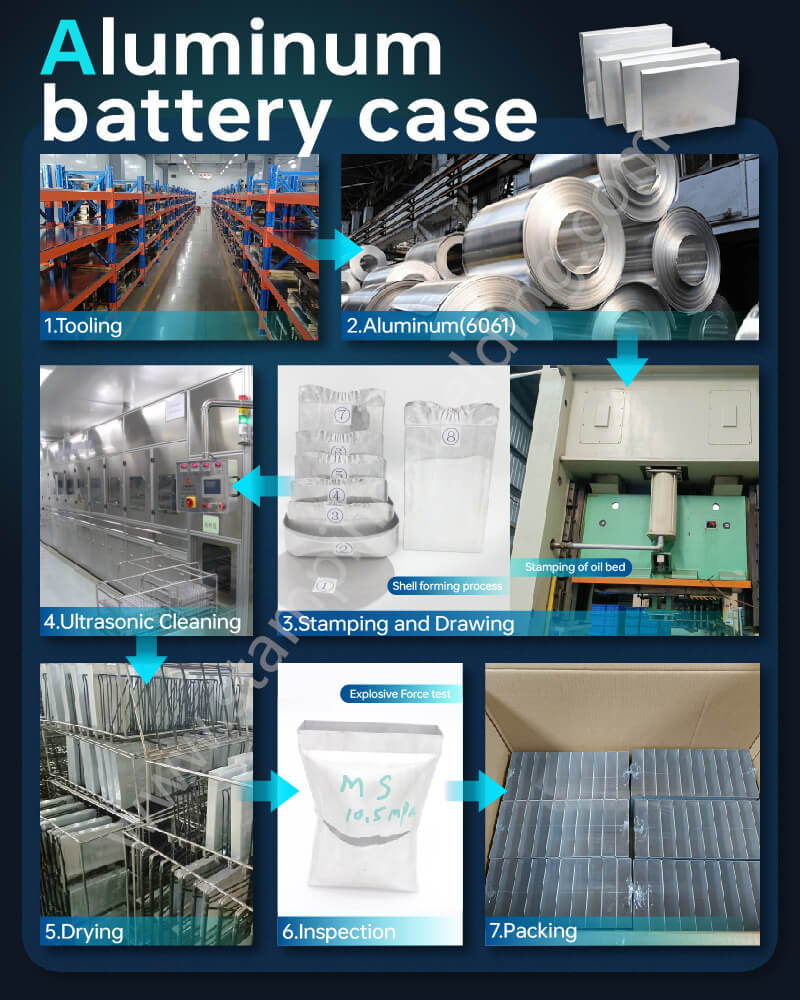

1- Products Name: Lithium Ion Cell Aluminum Shell
2- Aluminum Case size mainstream specifications for new energy vehicles and energy storage lithium square batteries (wide*long*high by mm):
54173
36130
29135
71173
27148
41255
and so on, all depend on customers' OEM required.
3- Base Material Standard:
(3.1) Battery Aluminum Cases: 3003-H14 Aluminum
Aluminum GB/T3880 standard, Tensile Strength 145-195MPa
(3.2) Battery Cover Plates: 3003-H14 Aluminum & T2Y2 Copper & Plastic Injection
Copper GB/T5231standard, Purity ≥99.99% Copper, Conductivity %IACS≥97, Hardness 80~110HV, Tensile Strength 245-345MPa.
(3.3) Cover Plates Assembly including:
Cover Plate: 3003 H14 Aluminum
Injection Part: PFA Plastic
Electrode Plate: 3003 H14 Aluminum
Positive Pole: 3003 H14 Aluminum
Negative Pole: T2Y2 Copper
Film: 3M PET transparent adhesive
Explosion Proof Valve: MFX2
Positive Connecting Pieces A&B: 1060 H12 Aluminum
Insulating Gasket: PP
Negative Connecting Pieces A&B: T2Y2 Copper+Nickel Plated
4-Surface Treatments:
(4.1) Anodizing
(4.2) Ultrasonic cleaning
5- Production Technologies:
(5.1) Stamping and stretching for Aluminum Battery Prismatic Cases
(5.2) Stamping, injection molding, machining, riveting, resistance welding, laser welding for Battery Cover Plates Assembly
6- Free Samples: 1-10pcs is allowed
7- Lead Time:Orders 10-20days,Samples 20-30days (including the tooling/die production);
8- Packing: pearl cotton/blister box inside and carton/pallet outside
9- Certifications: ISO9001, IATF16949, RoHS, REACH, etc.
10- Production Capacity: 5,000,000 pcs/month
11- Applications: Suitable for electric vehicles, electric motorcycles, electric bicycles, recreational vehicles, golf carts, electric lifts, cleaning vehicles power supplies; energy storage equipment such as forklifts and forklifts: based on solar, wind, geothermal, and ocean energy power generation systems Energy storage equipment; power grid peak shaving; uninterruptible power supply system UPS; used with solar cells as energy storage equipment, home lighting, etc.
A lithium-ion cell aluminum shell refers to the cylindrical or prismatic outer casing made of aluminum that encapsulates the electrodes, electrolyte, and separator within a lithium-ion battery cell. Here's an overview of the features and functions of the aluminum shell in a lithium-ion cell:
Encapsulation: The aluminum shell serves as the outer enclosure of the lithium-ion cell, providing mechanical support and containment for the internal components. It helps maintain the structural integrity of the cell and protects the electrodes and electrolyte from physical damage.
Protection: The aluminum shell acts as a protective barrier against external impacts, vibrations, and environmental factors that could potentially damage the cell. It helps prevent punctures, deformation, and leakage of electrolyte, safeguarding the cell's performance and safety.
Heat Dissipation: Aluminum is a good conductor of heat, allowing for efficient dissipation of heat generated during charging and discharging cycles. Proper thermal management is crucial for maintaining the temperature of the cell within safe limits and optimizing its performance and longevity.
Corrosion Resistance: Aluminum exhibits excellent corrosion resistance, particularly in the acidic environment of lithium-ion batteries. The aluminum shell helps protect the internal components of the cell from corrosion, ensuring long-term reliability and stability.
Lightweight: Aluminum is lightweight compared to other metals, contributing to the overall energy density and weight reduction of lithium-ion batteries. A lighter cell enables the development of more compact and energy-efficient battery packs for various applications.
Hermetic Sealing: The aluminum shell is typically sealed to prevent moisture, oxygen, and other contaminants from entering the cell, which could degrade its performance and safety over time. Hermetic sealing helps maintain the integrity of the internal components and extends the shelf life of the battery.
Manufacturability: Aluminum shells can be manufactured using various techniques, including extrusion, stamping, and machining, allowing for precise fabrication and customization of cell designs. This flexibility enables the production of lithium-ion cells with different sizes, shapes, and configurations to meet specific application requirements.
In summary, the lithium-ion cell aluminum shell plays a crucial role in providing mechanical support, protection, heat dissipation, corrosion resistance, lightweight construction, hermetic sealing, and manufacturability for lithium-ion batteries used in a wide range of applications, including electric vehicles, consumer electronics, and renewable energy storage systems. Its design and construction are essential factors in ensuring the safety, reliability, and performance of lithium-ion battery technology.


Contact Information:
Ms.Tina Tian (Sales Manager&Technology Engineer)
Xiamen Apollo Stamping Welding Technology Co., Ltd
Apollo Electronic Components (Xiamen) Co.,Ltd
Add: No.2, Chengyi North Road, Jimei Software Park, Jimei District, Xiamen City, Fujian Province, China, 361022
Mob/WhatsApp/WeChat: 0086-15985814329
Email: tina@stamping-welding.com
Web: www.stamping-welding.com , www.china-electronic-components.com
Since 2010, professional in Metal Stamping & Welding Solutions for New Energy EV & PV Fuse, Battery, Capactior, Relay, Switch, ect!